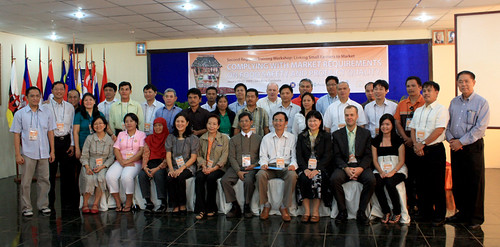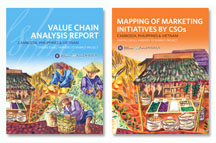Food Safety And Product Quality Issues And Problems
Country Presentations from Philippines, Cambodia, Vietnam, and Indonesia
Philippines
Mr. Luis Caballero Jr., Vice Chairperson of Zamboanga Sibugay High Value Marketing Crop, presented their community’s experience in maintaining food safety and quality standards for calamansi. In terms of maintaining product quality, this involved the processes before planting, the maintenance requirements during planting season, as well as the safeguards during picking, sorting, and storage. Mr. Caballero enumerated the following issues and challenges: (1) Some farmers / pickers do not follow the guidelines in size and maturity of calamansi during picking; (2) Branches dry out due to excess water and fungi; (3) Regular monitoring of an accredited agriculturist is needed; (4) An official monitor is needed during sorting; (5) Some farmers, especially those who live far from farm-to-market roads, tend to go back to old farming practices.
Cambodia
Mr. Noun, chicken producer from FNN, presented Cambodia’s experience in marketing dressed chicken. He related that chicken feed during the dry season are not sufficient. They also experience difficulty in transporting the product given the great distances of markets from the farms. Because of these, the traders are able to really push down the price. They buy live chickens and slaughter them after three days. This situation has led to questionable claims about hygiene and safety that affects the credibility of dressed chicken as a product.
Vietnam
Representatives from Vietnam reported the following issues and concerns with regard to their product, tea: limited farmers’ access to knowledge and information about food safety and product quality; poor processing techniques and equipments; limited quality management and limited access to product quality certificates; and difficulties in trade market development.
Indonesia
Mr. Haryono, explained that their organization consists of 60 cooperative groups of farmers in the forests of Sumatra that have 30 member-households each. The cooperatives help in the marketing of ten tons of organic rice per month by ensuring that market demands are met and by lending to farmers in need. Since they process rice manually, the main obstacle is in drying seeds especially during the wet seasons. As small farmers, they face obstacles in marketing and product quality, and would like to have some information on the practices in food safety and product quality in other countries. They also have 50 farmer-members who are into honey production. This could be expanded to include a greater number but the organization’s capacity to organize them is limited at the moment. They are now starting to market the honey to Binadesa outlets even as the product quality is not yet fully developed.

